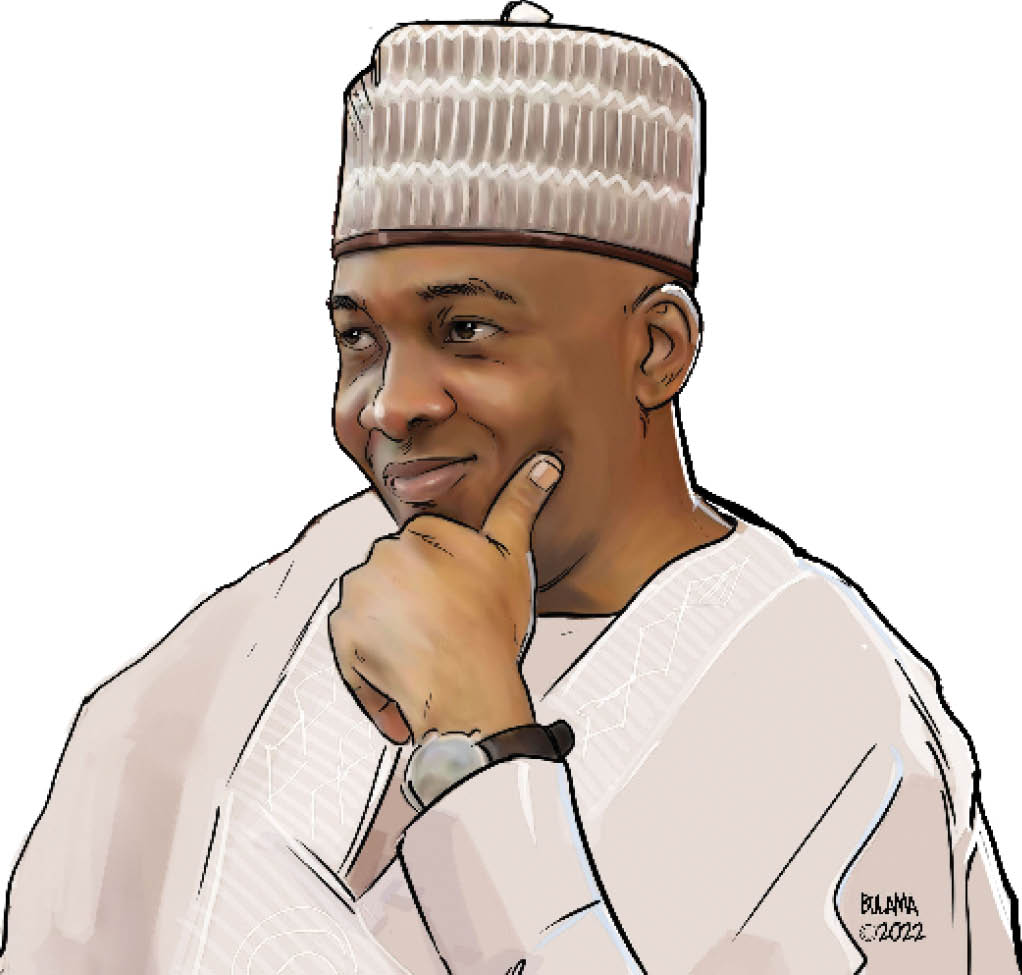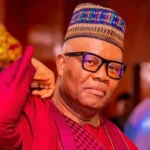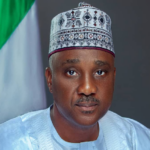A former Senate President, Abubakar Bukola Saraki, recently joined the growing list of political heavyweights jostling for the coveted presidential seat come 2023.
Saraki, a two-term governor of Kwara State, in a post on his official Facebook page, announced his intention to run for Nigeria’s presidency on the platform of the Peoples Democratic Party (PDP).
- Bandits closing in on Kaduna metropolis
- APC brokers peace between Ganduje, Shekarau, drafts power-sharing template
He wrote, “As we prepare for the journey ahead, I hope we can all join hands to get the ticket of our great party, PDP, and build a nation that works for all of us.
“Join me to make our communities safer and provide real opportunities for you and your families. I have a strong record of delivering and experience in making tough decisions.
“Let’s build a new Nigeria that works for EVERYONE! #GrowNigeria”.
Saraki is the second former Senate president to try his shots at the country’s number one political seat: Anyim Pius Anyim, had earlier declared his ambition to run on the same PDP platform.
The former Kwara governor will slug it out for the PDP ticket with a former Vice President Atiku Abubakar; Sokoto State Governor Aminu Waziri Tambuwal; a former Governor of Anambra State, Peter Obi; a former governor of Kano State, Rabiu Kwankwaso, and a host of others who have either declared intention or are reported to be nursing presidential ambition.
Even before his official announcement, Saraki’s National Campaign Advocacy Council led by its Chairman, Prof Hagher Iorwuese, had been junketing to different parts of the country to seek the blessing of those that matter in the Nigerian political space for his presidential candidacy.
One of such moves is the recent visit to Chief Edwin Clark and former military president, Ibrahim Babangida, who likened Saraki to a “self-propelled gun with strategic responsibility and functions”.
“You have identified the right person for the leadership of this country. We need a leader that can utilise our rich diversities to our advantage. We have abused our diversity and are not able to use it well to our advantage.
“I believe that the young Saraki can bring back this glory to our nation. He has my prayers, he has my absolute support,” Babangida said.
However, while Saraki’s team of supporters is rooting for his candidacy, several issues may work against his presidential ambition.
Zoning
The zoning of key elective positions is a big issue in Nigerian politics. Though it has no constitutional backing, it is seen as a gentleman’s power rotation arrangement to give different parts of the country a sense of belonging.
So, with the position of PDP national chairman zoned to the North, it is expected that the South will produce the party’s presidential candidate in line with the arrangement that has existed in the party since 1999.
Saraki, from the North Central, played a huge role in the success recorded by the PDP in its national convention last year.
As the chairman of the PDP National Reconciliation Committee, he toured the length and breadth of Nigeria, uniting aggrieved party members ahead of the convention. However, the power-sharing arrangement may not work in his favour.
The 2023 presidential ticket is yet to be zoned, but political leaders and other stakeholders from the South have been clamouring that the region should produce President Muhammadu Buhari’s successor.
Seventeen Southern governors as well as socio-political groups including Afenifere, Ohanaeze, Pan Niger Delta Forum and the Middle Belt Forum are insisting that power moved to the South in 2023.
A few days ago, a South-South leader, Chief Edwin Clark urged presidential hopefuls from the North to jettison such an idea in the interest of unity.
He said, “The PDP Constitution and by convention, it is now the turn of Southern Nigeria to produce the President of Nigeria in 2023, after President Muhammadu Buhari’s eight years. To do otherwise is to invite chaos, which will lead to the disintegration of our dear country.”
But an elder statesman, Alhaji Tanko Yakasai, yesterday tackled Clark, asking him to stop issuing threats when contributing to national discourse.
Yakasai who is in his late 90s, in his reaction, warned Clark against issuing threats. It could be recalled that Yakasai had supported the quest of southerners to produce the next president of the country.
“I think at our age, we should avoid resorting to threats whenever we are discussing national issues. What is expected of people at our age is to provide leadership by way of offering advice and correcting any mistake we discover made by younger Nigerians in the course of national discourse.
“Threats are not expected from senior citizens in any country. What is expected of the senior citizens is leadership, moderation, and guidance?” he said.
However, Saraki is undaunted by the zoning brouhaha. He had said despite the North Central producing the party’s national chairman, that did not prevent any qualified aspirant from any zone from contesting the presidency in 2023.
“On the issue of zoning, the party has made it very clear in all our meetings that even though we have zoned the position of party offices, it does not preclude anybody that has any presidential ambition. What we are looking for is the best candidate that will win the election,” Saraki said.
Graft cases
Blistering accusations and prosecution dogged Saraki’s Senate presidency. Corruption cases were traced to his time as a director of the defunct Société Générale Bank Nigeria (SGBN), governor of Kwara State and Senate president.
His trial began when he emerged as Senate president against his then party’s preferred candidate, a development that angered APC leadership. Since the inauguration in June 2015, Saraki’s Senate presidency was enmeshed in a protracted crisis that lasted up to the end of its lifespan.
He was accused of conspiring with bureaucrats in the federal parliament to “illegally alter the Senate rule with the intent of dubiously” ensuring his emergence.
The case was investigated by the police and based on findings and recommendations, Saraki, his Deputy Ike Ekweremadu, a former Clerk of the Senate Efeturi and a former clerk to the National Assembly, Salisu Maikasuwa, were charged with forgery and arraigned before a High Court in Abuja. They denied the charges.
In 2015, the Code of Conduct Bureau (CCB) filed a 13-count charge against Saraki for false declaration of assets, a case he pursued up to the Supreme Court, which in 2018 acquitted him of the charges.
The Economic and Financial Crimes Commission (EFCC) accused directors of the liquidated SGBN of mismanaging investors’ funds. In July 2021, the EFCC confirmed that Saraki was invited for questioning over allegations of corruption and money laundering.
Saraki later dragged the EFCC before an Abuja Federal High Court to query the legality of allowing the anti-graft agency to investigate him over allegations he said were part of the charge upon which he was previously docked before the Code of Conduct Tribunal (CCT).
The EFCC also sought the final forfeiture of Saraki’s Lagos houses, which the anti-graft agency said were acquired with N1.09 billion allegedly stolen from the coffers of Kwara State. But the prayer was dismissed in March 2021 by the Lagos Federal High Court presided by Justice Mohammed Liman.
North Central factor
Pundits say even if PDP leaves the contest for its presidential ticket open, Saraki may find it difficult to convince even his kith and kin from the North due to his northern minority ethnic group background.
By the Constitution of the Federal Republic of Nigeria 1999 (as amended), Saraki is qualified to aspire for the office of Nigeria’s president. He hails from Kwara, a state in the North Central geo-political zone battling the identity crisis of the northern Yoruba.
Kwara, like many other North Central states, is considered insignificant in the political calculus of northern politics but only relevant to inflate the demographic figure to sustain the population density of the so-called ’19 northern states’ when the region’s interest is threatened.
The Kwara identity crisis came to the fore when Saraki lost out woefully during the process of choosing a ‘northern consensus candidate’ for the PDP presidential primary for the 2011 election.
The inclusion of Saraki’s name among the potential northern consensus candidates listed for consideration by the 17-wise men led by Adamu Ciroma was greeted with brouhaha because “he is not northern enough.”
His father, Dr Olusola Saraki was reported to have suffered the same fate, a development that led him to form the Northern Union, after leaving the Arewa Consultative Forum over irreconcilable differences.
But a source close to the former Senate president said being from the North Central is one of the selling points of Saraki.
“Being from the North Central is a plus for Saraki and not a disadvantage as some are saying. He is from the middle of the country.
“His presidency will end all the divisions in the country and unite all. If given the PDP ticket, his candidature will resonate among all; Yoruba, Hausa, Igbo, and the minorities will see him as one of them.
“He has Fulani and Yoruba blood,” the source, who is optimistic that Saraki will pick the PDP ticket, said.

 Join Daily Trust WhatsApp Community For Quick Access To News and Happenings Around You.
Join Daily Trust WhatsApp Community For Quick Access To News and Happenings Around You.


